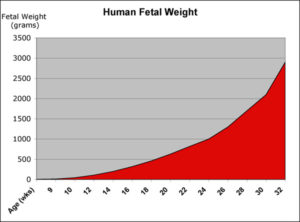 The amount of weight your infant gains starts slow and then begins to speed up near the end of pregnancy. A physician is concerned with the weight gain in the womb, and then again after the child is born. That is because their weight helps identify any possible problems. What mothers eat will directly reflect on the weight of the infant.
The amount of weight your infant gains starts slow and then begins to speed up near the end of pregnancy. A physician is concerned with the weight gain in the womb, and then again after the child is born. That is because their weight helps identify any possible problems. What mothers eat will directly reflect on the weight of the infant.
First Trimester
During the first trimester, your baby is just a mass of cells that does not weigh much of anything until at least eight weeks. This period is the most fragile for the fetus because it is very small and many things could go wrong.
If you smoke or drink, this is when you should stop so it will not affect the fetus’ growth, mental, or physical development. By the time you have reached the 12-
Monthly Visits
After your first trimester has passed, you will visit the doctor every four weeks for a checkup. Your stomach will be measured, which helps the doctor determine if your infant is growing properly.
16 weeks –
will be just over 3/4 of a pound, or 380 grams. He or she will be just over 8 3/4 inches. You should also be able to tell gender at this age.
24 weeks –
28 weeks –
Every Two Weeks
The four visits will be done every two weeks. You will have your sugar levels tested, as well as your infant’s growth. More emphasis is put on fetal development to make sure that he or she does not stop growing, or suddenly develop fetal distress. Your infant should gain about 3/4 of a pound every two weeks.
30 weeks –
32 weeks –
34 weeks –
36 weeks –
End of the Pregnancy
Your infant will gain about a half pound a week, and a half an inch until delivery. Most women deliver between 39 and 42 weeks gestation. The average weight of an infant at birth is between seven and eight pounds. The average length of an infant is between 18 1/2 inches and 20 inches.
After Delivery
Once you deliver your baby, he or she will lose some weight initially. This does not mean there is anything wrong with your child, as long as it falls under the ten percent line. After that, the amount of weight gain will depend on whether or not your child is breastfed or formula fed. That is because breast milk digests completely and is not stored. The following rates are only rough estimates. Physicians prefer to look at where the infant is on the growth chart and that he or she remains very close to that percentile with no major changes.
Birth to Four Months –
Four to Six Months –
Six Months to One Year –
